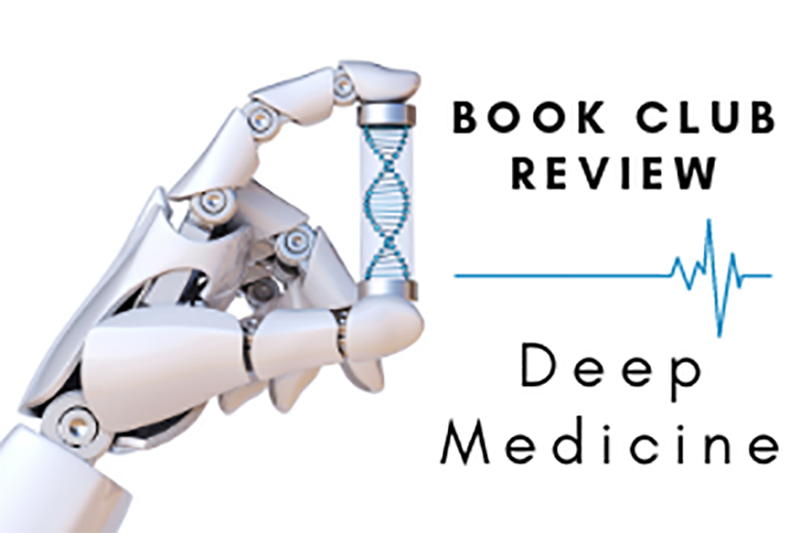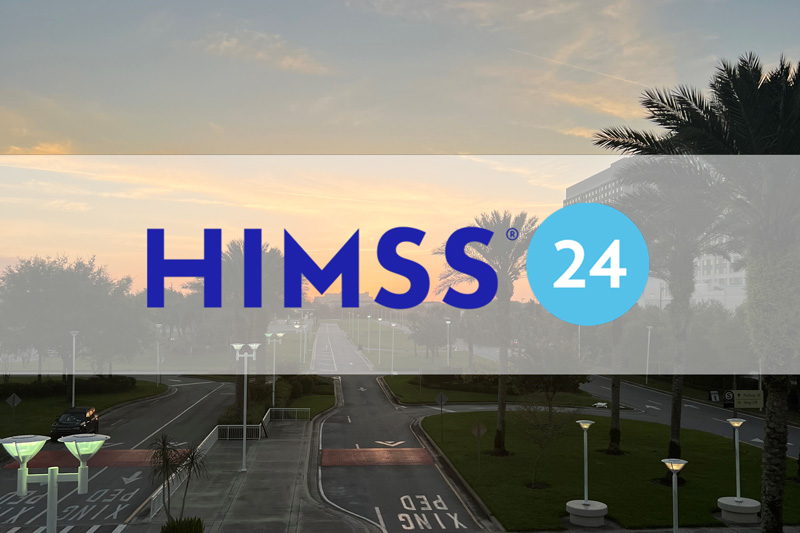They say you can’t replace the human touch, but many believe artificial intelligence (AI) is learning just how.
In Deep Medicine: How Artificial Intelligence Can Make Healthcare Human Again, Eric Topol examines AI’s role in healthcare and how we may be welcoming a new group of colleagues sooner than we think. Let’s take a look at “Deep Medicine” in today’s Dimensional Insight book club review.
Meet our panel
Our book club panel for “Deep Medicine” consists of: Kathy Sucich, director of healthcare marketing; George Dealy, vice president of healthcare applications; Jens Rundquist, business developer at Dimensional Insight partner Infotool, based in Sweden; Nishtha Adroja, business intelligence consultant; and myself.
What was your biggest takeaway from the reading?
Kathy: I think it’s exciting that leaders in medicine are thinking about how we can successfully integrate artificial intelligence into healthcare. We may not have it all figured out yet, but we realize that something in healthcare has to change, and here’s one way that we are hopeful will lead to some significant change to better both patient outcomes and the physician-patient relationship.
George: That a leading thinker in healthcare believes that artificial intelligence will fundamentally change how care is delivered, and health is maintained, more quickly than we realize.
Jens: My biggest takeaway is that AI really can be a game changer in healthcare by providing more time spent together for doctors and patients. AI will also give better support to doctors and other healthcare staff which in turn will give better results and healthier patients. I think it’s a terrible development that the average time for a first visit at the doctor is 12 minutes today, when it was 60 minutes back in the 70’s.
Nishtha: My biggest takeaway is the future vision that AI and humans have to work in tandem to achieve lasting success in healthcare and patient life expectancies. Being a futurist, Topol describes this vision in detail. Machines can help in assisting healthcare practitioners to spend more time with patients. This extra time allows for more humaneness with patients, thus enabling “empathy’, a characteristic that cannot be simulated by machines. The triad of deep phenotyping, deep learning, and deep empathy can pave the way to an overhaul of the healthcare system by promoting prevention.
Kayla: That collaboration comes in many forms. Even though we’re in 2019, we’re still not that accepting of AI’s presence in multiple industries.
How can we make healthcare more human?
Kayla: By being present. A moment in the book that stood out to me was when Topol said that patients know their diagnosis, all that the physician has to do is listen. Often times we feel distant from our physicians because they are quick to find a solution without hearing our whole story.
Jens: To use AI where it is more efficient than humans to create more time for doctors to really talk to and understand their patient’s situation. One example is to let AI help the doctor to get data into the EMR-system. Today, many patients complain that their doctor has no time to talk to them as they are constantly writing on the key board during the visit.
George: I agree with Eric Topol that the provider-patient interaction has lost the “personal touch”. The consequences of this both for patients and providers is pretty dire. Bringing the human element back to medical practice could both reduce physician burnout and increase their capacity for compassion toward patients. Advanced technologies, including voice recognition, natural language processing, AI and others can help make this possible by supplementing providers’ thought processes, memory and listening to help counsel patients toward better decisions around their health.
Nishtha: With AI assistance in medicine, clinicians will no longer need to spend six hours a day entering data into an EMR. Burnout decreases, energy improves, and clinicians get to spend their time doing what they care about most – caring for patients. AI systems would have the capability to accurately diagnose conditions from the entire dataset of conditions as it is not humanly possible to accurately pinpoint all possible conditions. This shifting of time, invested for diagnosis, from a medical practitioner to a machine would allow the practitioner to spend that time with the patient, thus establishing and strengthening the human empathy connection.
Kathy: By using technology to free physicians’ time instead of create new burdens. Once physicians can go back to the actual practice of medicine – taking time with the patient, really listening to them, conducting thorough examinations – we will restore humanity to medicine.
A common theme throughout the book is the fear of artificial intelligence replacing human labor. Is this something that you fear?
Jens: AI can replace administrative tasks and give the healthcare staff better support. Some human labor will be replaced but on the other hand there will be a need for new roles and new tasks. In other words, new jobs will come with AI. I do not fear this development. Instead I believe that AI can give us better care at a lower cost.
George: Not sure. Most AI experts claim that we’re a long way from anything approaching human intelligence. However, most jobs — white and blue collar alike — don’t require a whole lot of advanced thinking. And what those jobs do require, in many cases, could be done more reliably, consistently and efficiently with creative applications of AI.
Kayla: Not necessarily. I think that we need to move past our fear of being replaced and learn how to incorporate AI as a valuable team member instead. Yes, there are some jobs that AI can do, but there are plenty of other roles that they can’t take on. If we were to fear anything, it would be to fear our dependency on it in areas where it isn’t needed or is becoming too involved.
Kathy: Not really. AI has the potential to shift the types of jobs available. That means, however, that it is important to make sure we are current in the “new” skills required for jobs. As it relates to medicine, AI has the potential to augment physicians, but I don’t think it will never replace them. Physicians still need to make decisions and use critical thinking skills. And of course, patients still need the human touch in medicine.
Nishtha: The major fear that people have is about losing jobs to AI. While it is true that millions of jobs that are currently performed will be eliminated, many jobs would be transformed and millions more will be created. Jobs would not be eliminated but shuffled into different categories. AI cannot completely replace humans at all, but only aid in completing tasks that do not require complete human attention. This would only allow humans to pay more attention to other more pertinent issues which currently ail people and the world. This would, of course, require learning new skills on the part of humans, but this resilience and adaptation is how humans have always evolved – by learning new things to survive and adapt to changing situations.
What are the benefits to having AI medical assistants?
Nishtha: In today’s times, AI medical assistants have very limited capabilities. This is due to very limited data collection, scant validation and lack of any long-term objectives. These culminate into a rather restrictive medical assistance. However, for the future, AI medical assistants are of prime importance. AI medical assistants will have the ability to include, in their diagnostic determination, factors that are not considered with equal weightage, such as a patient’s genetic history, home and workplace environment characteristics, etc. AI medical assistants can also aid in real-time monitoring of a patient’s health by using sensors and other monitoring tools. AI systems would have the capability to accurately diagnose conditions from the entire dataset of conditions as it is not humanly possible to accurately pinpoint all possible conditions. This shifting of time, invested for diagnosis, from a medical practitioner to a machine would allow the practitioner to spend that time with the patient, thus establishing and strengthening the human connection.
Kathy: I think AI medical assistants will augment (but not completely replace) diagnosis of diseases. AI can hopefully spot markers of disease before a physician would be able to (such as with sepsis). I do think that there are important things “outside the algorithm,” though, that are important for doctors to still rely on their own training and expertise. For example, algorithms can’t look into a patient’s eyes or see how they respond to a doctor’s touch on a pain point. I think it’s important to not rely so much on AI that we eliminate those aspects of medical care.
George: They can provide physicians with access to volumes of information, precision in pattern recognition and complex computation far beyond human comprehension. If physicians can establish a comfortable and productive working relationship with these technologies, they will be able to extend their own capabilities to the benefit of patients and themselves.
Jens: The doctors will have a much better understanding of what diagnoses are possible for the patients when having a large volume of data analyzed with AI. The challenge is to also make AI explain how the presented result was calculated.
Kayla: Efficiency. AI takes care of the work that doctors need so they can focus on what they do best; take care of their patients. Doctors want to go back to being present with their patients, and AI will allow for that to happen.
Topol defines shallow medicine as “unintelligent medicine”. How do you define shallow medicine?
Jens: Shallow medicine to me, is when a doctor gives you a diagnosis in just a few minutes not knowing your background and other possible problems that might have put you in the situation. It’s also the lack of feedback to the doctor if the diagnosis was correct or not.
Kathy: To me, shallow medicine is medicine that doesn’t take the individual patient into account. It’s when the system looks at me solely as the symptoms I am presenting with on that particular day, and does not take into account my medical history or just me as a person. It’s when I am just another product on the assembly line of healthcare that needs to be checked and managed before quickly moving on to the next thing.
Nishtha: Shallow medicine, for me, is more than just unintelligent medicine. A system, according to us IT folks, is unintelligent if it has required information and yet cannot perform requisite tasks. Shallow medicine, however, is medicine practiced based on biases and limitations. As Topol puts it, shallow medicine is a culmination of insufficient data, insufficient time, insufficient context and insufficient presence. It is essential for all of these elements to be in place to solve the complex jigsaw of human healthcare.
Kayla: Shallow medicine is care that isn’t careful. A common theme throughout the book is empathy, and a physician has to care about the patient in order to find a solution to their pain. Topol mentions how doctors can be overconfident, biased, and quick to assume; which are shallow traits.
George: The practice of medicine when it doesn’t take advantage of resources, including information and technology, that could benefit both providers and patients. Topol asserts that this may become the basis for claims of malpractice in the future.
To whom would you recommend this book?
Kathy: Healthcare providers. I think technologists are largely “bought in” to the potential of AI. But it’s the providers who will really need to embrace AI and integrate it into their practices if it is really going to make a difference.
Kayla: Healthcare professionals who want to make a change.
George: Providers, patients (aka people), caregivers, technologists — and generally anyone interested in the future of health and healthcare.
Jens: I would say any person that is interested in healthcare and the possible development with new technology. This is a real interesting book that gives you a lot of new ideas.
Nishtha: I would recommend this book to doctors, physicians, clinicians, and medical professors and students, and also to AI analysts and consultants, so that they can understand that they can all collaborate and work together on bringing about a change in healthcare. Topol gives us a very detailed view into how AI can be used to take up more tasks, thus allowing healthcare practitioners to actually invest more time with patients, thus completing the human angle to healthcare – or as Topol puts it, putting the “care” back in healthcare.
What’s next
For our next selection, we’ll be reading Range: Why Generalists Triumph in a Specialized World, by David Epstein. In this book, Epstein tunes in to the mind of the broad thinker, the one without specializations. Since they are well-versed in different areas, are they more likely to succeed than those with concentrations?
If you would like to read along with us you have until August 29th. Let us know in the comments if you have any suggestions for future book club reads or if you would like to be a part of the panel.
Want more of our book club? Here are our other book club reads:
- DIUC19 Day 4: Final Training and Farewell - August 8, 2019
- DIUC19 Day Three: Sessions and Product Showcase - August 7, 2019
- 4 Ways to Sabotage a Data Analytics Project - July 25, 2019



